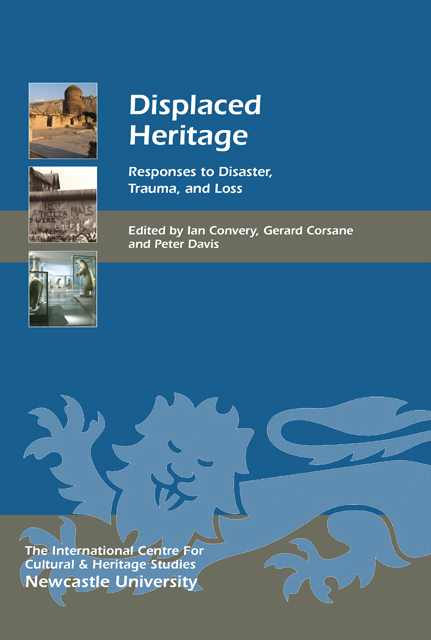Book contents
- Frontmatter
- Contents
- List of Illustrations
- Acknowledgments
- List of Abbreviations
- Preface
- Introduction
- Displaced Heritage: Histories and Tourism
- Displaced Heritage: Trauma, Confinement and Loss
- Displaced Heritage: Lived Realities, Local Experiences
- Displaced Natural Heritage
- Endpiece
- List of Contributors
- Index
- Heritage Matters
10 - The Politics of Remembering Bhopal
Published online by Cambridge University Press: 24 February 2023
- Frontmatter
- Contents
- List of Illustrations
- Acknowledgments
- List of Abbreviations
- Preface
- Introduction
- Displaced Heritage: Histories and Tourism
- Displaced Heritage: Trauma, Confinement and Loss
- Displaced Heritage: Lived Realities, Local Experiences
- Displaced Natural Heritage
- Endpiece
- List of Contributors
- Index
- Heritage Matters
Summary
In 1984 the world witnessed one of its worst industrial disasters in Bhopal, India. Three decades later, survivors’ poor health and a continuing lack of justice makes Bhopal a site of continued suffering. This chapter engages with the politics of remembering Bhopal. The state of Madhya Pradesh plans to establish a memorial museum to provide healing through closure and restore Bhopal’s heritage. However the survivors wish to assert their moral right to their memory, and contest the notion of closure through commemoration: they plan to connect remembrance with vigilance by generating their own memorial. This chapter explores the politics inherent between the State’s and the local community’s actions towards remembering the disaster. It is based on the author’s doctoral fieldwork (2010–11), her previous engagement with the survivor-led movement and her current role with the Remember Bhopal Trust, set up in 2012 to strengthen survivors’ efforts towards creating a people’s memorial museum distinct from that proposed by the State.
Introduction
The 1984 Bhopal gas disaster is known as one of the world’s worst industrial disasters. At midnight on 2 December 1984, methyl isocyanate (MIC) gas leaked out from the Bhopal pesticide plant run by the American multinational Union Carbide Corporation (UCC), killing over 8000 people in the first three days alone; within the next two decades another 25,000 died, and more than 150,000 were left with chronic ailments (Amnesty International 2004). Groundwater contamination that began two years before the gas leak, due to UCC’s routine toxic dumping, has subsequently affected 18 communities (Moyna 2012; CSE 2009). The pollution of soil and water in Bhopal has led to a second generation of people being affected, caused by toxins entering the breast milk of gas-affected women (Agarwal and Nair 2002). Even as UCC’s current owner, the Dow Chemical Corporation, rejects any liability, Bhopal remains a site of ongoing disasters and suffering.
In the last three decades, the State and the foreign multinationals UCC-Dow have acted together to attempt to dilute the memories of the gas leak and to subsume within it all memories of the water disaster that pre-dated it. Meanwhile, the ‘mnemonic communities’ of survivors (Zerubavel 2003) emerged as an organised global justice movement; 30 years later this movement remains dedicated to shaping the memory and perception of Bhopal by investigating and interpreting survivors’ lived reality (Garbarino 1995).
- Type
- Chapter
- Information
- Displaced HeritageResponses to Disaster, Trauma, and Loss, pp. 107 - 120Publisher: Boydell & BrewerPrint publication year: 2014
- 1
- Cited by

